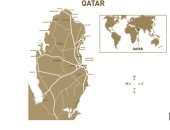 In recent days, two important pieces of information about the Qatar Investment Authority, the emirate’s sovereign wealth fund, emerged into public consciousness.
In recent days, two important pieces of information about the Qatar Investment Authority, the emirate’s sovereign wealth fund, emerged into public consciousness.
First, the emir has replaced the chief executive of the SWF, Ahmad Al-Sayed, with a royal family member, Sheikh Abdullah Bin Mohammed Bin Saud Al-Thani. The state-run news agency announced as much on December 3d.
Second, the QIA has gotten behind the makers of the ride-sharing app, Uber.
An Executive Sheikh-Up
Taking the first, first: The emir, His Highness Sheikh Hamad bin Khalifa Al Thani, has gone beyond just appointing a new in-family CEO. He has also refashioned the board. Another member of the royals, that is, of the Al-Thani family, is the QIA board’s new chairman, and yet another member of the Al-Thani family is the new vice chair.
By way of context: the Al-Thani family has been running Qatar since 1825. This isn’t one of those ceremonial wave-at-the-tourist monarchies. The family really runs things. Indeed, there is no real institutional base whence anyone could challenge their power peacefully: there have been no legislative elections since 1970, and political parties are forbidden.
Despite the fact that the same (royal) surname shows up on a lot of office doors, the QIA is no mere family office. It’s a very high-profile operation, with stakes on Volkswagen, Barclays, and the London Stock Exchange. Indeed, the Financial Times has called the fund “the world’s most aggressive deal hunter.”
More than that, the QIA is a great example of what people worry about when they worry about SWFs in general. It seems disposed to throw its weight around, in an area where that weight (large enough in absolute terms according to some accounts it has roughly $300 billion in AUM) is made still greater by low interest rates globally. And people not surprisingly worry whether the weight throwing is all for the end of enriching Qatar, or whether it is for political aims as well.
Notorious Opacity
The concern about politics is linked with the issue of the transparency or opacity of SWFs. And as it happens, GeoEconomica ranked SWFs earlier this year on matters of governance and transparency. It put the QIA at the bottom of its list.
QIA’s stinginess with disclosure should be a major concern, GeoEconomica’s analysts said in their report.
Consistent with the reputation for opacity, QIA has not told the world why the former CEO, Ahmad Al-Sayed, got the boot: aside from the wrong bloodline. He had taken the job as part of another shake-up more than a year before.
And the change at the top seems likely to be unrelated to another bit of QIA news in recent days: the SWF is getting behind Uber.
Uber of course is the company responsible for the now-famous and controversial ride-sharing app that poses a great (and deserved) threat to the traditional medallion-based taxicab business model. In its latest financing round, Uber has raised $1.2 billion (a result that implies a $41 billion valuation for the privately held company).
A Fascinating Alliance
It isn’t clear how much of the $1.2 billion comes from QIA. But the alliance is fascinating. After all, if Qatar can be said to have a single overriding interest in the affairs of the rest of the world it is this: that the rest of the world continue to use a lot of oil. According to some estimates, roughly 80% of the average barrel of oil is used, ultimately, for transportation. So: will the spread of Uber have any predictable effect on the western world’s dependence on the stuff?
If Uber increases the efficiency with which gasoline is employed in urban contexts, then the answer is, likely, yes. But the direction of the predictable effect may be counter-intuitive for some.
Suppose I’m an Uber user, and Uber’s chief benefit for me is that it allows me to live the life I’m now living, in a city, without owning a motor vehicle of my own, and without incurring the costs associated with that ownership. That’s a great efficiency gain for me, but it wouldn’t necessarily seem to impact petroleum use. The same amount petroleum is still employed in getting me from point A to point B, regardless of whose name is on the title to the vehicle.
On first blush, you might then say, Uber is a wash for Qatar.
On further inquiry, though (and this is what authors like Peter Huber and Mark Mills have called the “paradox of efficiency”), more efficient use of a resource almost invariably leads to more of it than before. To the extent that city dwelling folks have found a less expensive way of living the life they’ve lived before, they almost certainly will not just go on living the life they’ve lived before – they won’t simply sit on their savings. Instead, their life styles will change in ways that will involve more mobility, and in the end more fuel consumption.
More efficient “almost invariably means … a higher burn rate, and more miles traveled, and more energy consumption overall,” Huber and Mills wrote a decade ago.
It is possible that the QIA is very far-sighted and is acting in dependence upon the paradox of efficiency in supporting Uber. Or, possible, QIA is simply trying to make a solid return quarter-after-quarter. Either way, it’s one heck of an important family office.



